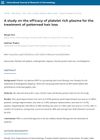 2 citations,
January 2023 in “Pharmaceuticals”
2 citations,
January 2023 in “Pharmaceuticals” Natural products and phytochemicals may help with hair regrowth, but more research is needed.
 January 2025 in “Journal of Cutaneous and Aesthetic Surgery”
January 2025 in “Journal of Cutaneous and Aesthetic Surgery” Low-level laser therapy effectively improves hair growth in androgenetic alopecia with minimal side effects.
[object Object]  3 citations,
May 2018 in “Journal of nutritional health & food science”
3 citations,
May 2018 in “Journal of nutritional health & food science” Nutritional supplements can help manage hair loss and promote hair growth by strengthening hair roots and countering harmful effects of pollution, smoking, and deficiencies in vitamins and minerals.
 1 citations,
January 2020 in “The Egyptian Journal of Plastic and Reconstructive Surgery”
1 citations,
January 2020 in “The Egyptian Journal of Plastic and Reconstructive Surgery” PRP or nanofat injections improve scar tissue quality but don't significantly boost hair transplant results for scarring hair loss.
 January 2018 in “Springer eBooks”
January 2018 in “Springer eBooks” Different races and genders have unique skin and hair issues, requiring specialized care and more research for effective treatment.
 17 citations,
August 2015 in “Expert Opinion on Pharmacotherapy”
17 citations,
August 2015 in “Expert Opinion on Pharmacotherapy” The document concludes that oral finasteride and topical minoxidil are effective for genetic hair loss, while other treatments for different types of hair loss show promise but need more research.
 4 citations,
May 2020 in “Annals of palliative medicine”
4 citations,
May 2020 in “Annals of palliative medicine” Plum blossom needle acupuncture with qi-invigorating therapy is more effective for Seborrheic Alopecia than Western medicine.
 June 2020 in “Al-Azhar International Medical Journal (Print)”
June 2020 in “Al-Azhar International Medical Journal (Print)” Adding Platelet-rich plasma (PRP) to hair transplants can speed up recovery and increase hair density, but it doesn't help with androgenic alopecia.
 29 citations,
April 2019 in “Lasers in Medical Science”
29 citations,
April 2019 in “Lasers in Medical Science” Laser and minoxidil combo promotes better hair growth than minoxidil alone, safely.
 10 citations,
April 2018 in “Actas Dermo-Sifiliográficas”
10 citations,
April 2018 in “Actas Dermo-Sifiliográficas” In 2017, Spanish dermatologists most often prescribed minoxidil and finasteride for male hair loss, and minoxidil and oral contraceptives for premenopausal female hair loss.
 November 2018 in “Springer eBooks”
November 2018 in “Springer eBooks” Finasteride and minoxidil are effective, low-risk treatments for male hair loss, and patient education on these therapies is important.
PRP hair treatment is generally safe but may cause minor pain, bleeding, redness, and scalp tightness, and isn't suitable for everyone.
August 2022 in “Nutrients” Nutritional supplements may help improve hair growth in female pattern hair loss.
 20 citations,
March 2006 in “Seminars in Cutaneous Medicine and Surgery”
20 citations,
March 2006 in “Seminars in Cutaneous Medicine and Surgery” Minoxidil and finasteride can help with hair loss, but more research is needed to improve treatments for certain types of hair loss.
 19 citations,
June 2019 in “Clinical Drug Investigation”
19 citations,
June 2019 in “Clinical Drug Investigation” Platelet-rich plasma injections significantly improve hair density and thickness in both male and female pattern hair loss, especially in early stages.
 14 citations,
May 1987 in “Archives of Dermatology”
14 citations,
May 1987 in “Archives of Dermatology” Tissue expansion is an effective treatment for certain types of hair loss, providing immediate coverage with hair-bearing skin.
 1 citations,
November 2023 in “Biomaterials advances”
1 citations,
November 2023 in “Biomaterials advances” Sponges made of soy protein and β-chitin with human cells from hair or fat can speed up healing of chronic wounds.
 1 citations,
November 2018 in “International research journal of pharmacy”
1 citations,
November 2018 in “International research journal of pharmacy” Platelet Rich Plasma (PRP) treatment is safe and effective for hair growth in people with androgenic alopecia, and can also help treat bacterial infections.
 1 citations,
April 2018 in “Lasers in Surgery and Medicine”
1 citations,
April 2018 in “Lasers in Surgery and Medicine” New treatments and technologies in laser medicine show promise for improving skin conditions, fat reduction, cancer treatment, wound healing, and hair restoration.

Regenerative cosmetics can improve skin and hair by reducing wrinkles, healing wounds, and promoting hair growth.
 February 2020 in “International Journal of Research in Dermatology”
February 2020 in “International Journal of Research in Dermatology” Platelet rich plasma is not proven as a treatment for hair loss despite some improvements.
 1 citations,
January 2009 in “CRC Press eBooks”
1 citations,
January 2009 in “CRC Press eBooks” Finasteride increases hair count and improves hair growth with low risk of side effects.
 1 citations,
January 2014 in “Hair therapy & transplantation”
1 citations,
January 2014 in “Hair therapy & transplantation” OMICS International aimed to make scientific research freely accessible to everyone.
 1 citations,
January 2010
1 citations,
January 2010 Asian women experiencing hair loss often feel embarrassed and unhappy, but hair transplantation can offer natural-looking results and improve their self-confidence.
 September 2014 in “Hair transplant forum international”
September 2014 in “Hair transplant forum international” Caffeine, niacinamide, and panthenol may improve hair growth, fullness, and healing when applied to the scalp.
 76 citations,
January 2007 in “American Journal of Clinical Dermatology”
76 citations,
January 2007 in “American Journal of Clinical Dermatology” Women with PCOS often have skin problems like excessive hair, acne, hair loss, and dark patches, which can be treated with hormonal and non-hormonal therapies.
 34 citations,
April 2009 in “Expert Opinion on Pharmacotherapy”
34 citations,
April 2009 in “Expert Opinion on Pharmacotherapy” Some treatments work for common baldness, but there's less evidence for other hair loss types, and more research is needed.
[object Object]  10 citations,
January 2008 in “PubMed”
10 citations,
January 2008 in “PubMed” Hair transplantation is a safe, outpatient procedure for restoring hair in individuals with pattern hair loss or certain types of scarring, requiring a trained physician and team, with ongoing medical treatment recommended.
 5 citations,
January 2015 in “Current problems in dermatology”
5 citations,
January 2015 in “Current problems in dermatology” The document provides a practical guide for diagnosing and treating various types of hair loss.
2 citations,
July 2009 in “Medical hypotheses” Identifying specific hair follicle parts could lead to better hair loss treatments.



























